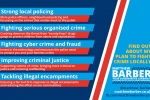
Cyber Resilience Centre launched across the South East Region to help businesses
A new partnership between the police, the private sector and academics has been launched across the South East to aid businesses in protecting themselves from cybercrime.
The South East Cyber Resilience Centre (SECRC), is part of a network of centres being established across the country to provide businesses and organisations, with an affordable way to access cyber security services and consultancy to help protect themselves from attack.
The SECRC offers a range a membership options depending on what level of support businesses in Thames Valley need. The Core Membership is free and provides businesses with 50 or fewer employees, access to a range of resources and tools to help them identify their risks and vulnerabilities, as well as providing guidance on the steps they can take to increase their levels of protection.
The centre is headed up by Director, Justin Torgout, who is also a Detective Superintendent with the South East Organised Crime Unit.
The South East CRC is the fifth region to go live as part of a £2 million national programme to develop a network of Cyber Resilience Centres across the country.
Moving forwards the centre will generate income through the supply of a broad mix of products and services. The CRC is a not for profit organisation which means all revenue generated will be invested back into helping to keep businesses safe.
Businesses can sign up for one of the SECRC memberships at www.secrc.co.uk.
Thames Valley launches proactive drive to reduce drug use
Thames Valley Police and partners are rolling out a drug diversion scheme for under 18’s forcewide as part of work being delivered by the Violence Reduction Unit.
The scheme aims to reduce the harm caused by the use of drugs and drug related offences. Specialised support aims to break the cycle of reoffending and long term demand upon police and judicial services for those found in possession of small quantities of drugs. Traditional criminal justice prosecutions remain an option for those who do not engage with the scheme. Anyone suspected of dealing or trafficking drugs will be arrested and prosecuted as normal.
The youth drug diversion scheme is being rolled out across all Thames Valley Local Policing Areas in co-ordination with the Youth Offending Teams following the success of two pilots. In November 2018, the force launched a pilot scheme in West Berkshire. Then, in January this year, a second pilot scheme was launched in Windsor and Maidenhead.
Matthew Barber, Deputy Police & Crime Commissioner for Thames Valley, said: “Our Violence Reduction Unit is seeking to make long term reductions in drug use and serious violence.
“This drugs diversion scheme is designed to tackle the root causes of drug use amongst young people in order to prevent them reoffending.
“Residents across Thames Valley often raise concerns about drug use in their communities.
“This new approach will enable the police to better respond to the concerns of the public and tackle this problem.”
Read more about the scheme
More details available on my website www.matthewbarber.co.uk Read more
Explaining the drugs diversion
Read my latest article about the drugs diversion scheme Read my article
Watch my online discussion
In conversation with Dr Rachel Ward & Chief Inspector Kew Watch video online
New police protocol launched to assist blind and visually impaired people
Thames Valley Police has launched a new protocol which provides better security to visually impaired members of the community who need to identify if a person at their front door is a police officer.
The Visual Impairment Protocol (VIP) applies to anyone with a visual impairment, whether with full blindness, with a guide dog, or with any sight-impaired condition.
It can also be used by anyone who cares for, or supports, someone who is visually impaired.
It is very important that police officers and other police employees who come to the door for whatever reason are able to identify themselves. Usually, when officers go to someone's property, they have an identification card to identify themselves and prove who they are.
However, it isn't as easy for visually impaired people who may not be able to see a photograph or name on an identification card clearly.
In short, the VIP works by setting up a password system at the address of a visually-impaired member of the community. When an individual calls either 101 or 999 and informs the call handler that they have a sight impairment, a password of their choice will be agreed.
When an officer then visits that address, they will be expected to state the password to the person answering the door. If they cannot give the password, then they should not be allowed into the address.
If you care for someone who has a visual impairment, or have any friends, family members or colleagues with a visual impairment, please highlight the protocol to them.
Week of action to tackle ‘county lines’ drug dealing
Last month Thames Valley Police took part in a national week of action as the force continues its commitment to combat county lines drug dealing.
The work was part of a national week of action led by the National Crime Agency which focused on disrupting those who look to exploit communities by carrying out this sort of offence.
A number of warrants took place across Buckinghamshire, Berkshire and Oxfordshire as part of this week of action, which contributed to the force’s ongoing Stronghold campaign to work in partnership to tackle serious organised crime and exploitation.
County lines drug dealing is the name given to drug dealing where organised crime groups (OCGs) use phone lines to move and supply drugs, usually from cities into smaller towns and rural areas.
This type of offending exploits children and vulnerable people who may have addiction or mental health issues.
Victims are often exploited by OCGs who use intimidation and violence in order to supply drugs to others.
A number of activities have taken place across the force in order to safeguard vulnerable people and to bring to justice those responsible for county lines drugs dealing.
Alongside enforcement activity, this has included visiting previous victims of cuckooing, and working with partner agencies such as local authorities.
Thames Valley officers have worked with schools in order to warn and inform pupils and teachers of the dangers of drugs and drug supply, and how criminal groups can look to exploit children.
During this week, the force launched a unique lesson plan package to Thames Valley schools providing them with activities and resources to teach secondary school children about the dangers of child drug exploitation.
The schools package uses a video of Dee, an ex-offender who was involved in child drug exploitation, talking about his experiences and the realities and impacts of these crimes.
There have also been knife arches at railway stations, along with dogs and high visibility patrols.
Additionally, during this week of action, Thames Valley Police has:
- Executed 20 warrants across the Force
- Arrested 91 people
- Seized about 573g of crack, heroin and cocaine
- Seized 27 weapons and 91 mobile phones
- Seized more than £50,000 in cash associated with drug dealing
- Visited 38 schools to engage with pupils
- Engaged with 72 vulnerable people
A significant amount of intelligence has also been gathered which will help to inform the force’s continued work to combat county drugs lines in our communities.
Matthew Barber, Deputy Police & Crime Commissioner said: "Focussed weeks of action like this can make a real impact in tackling these organised crime gangs, but the work by Thames Valley Police to tackle county lines gangs goes on every single day."
It is important that the public helps the police in the fight against serious organised crime by reporting drug dealing or anything else which is of concern to them. If you are worried that someone you know is being exploited by drug dealers, please report it. Thames Valley Police can then take the necessary steps to safeguard them and identify those responsible.
You can make a report by calling us on 101, or by contacting Crimestoppers anonymously on 0800 555 111.
Click here to see a video of some of the Force's enforcement activity.
Make your voice heard to help shape the future!
The role of the Police & Crime Commissioner includes holding to Chief Constable to account, setting the council tax precept for policing, commissioning services for victims of crime, funding community safety partnerships and setting the policing priorities for the Thames Valley.
I want to know your views about policing where you live. Please spare a few moments to complete my short survey and tell me what you think is going well and what can be done better. Visit www.matthewbarber.co.uk/haveyoursay.


